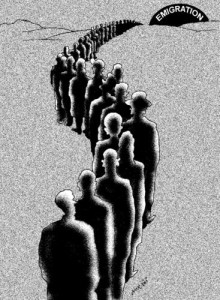Imagine leaving absolutely everything behind, your family, Job, the comfort of a home and familiar surroundings and even your national identity. There are millions of people who have been in this situation and the number continues to grow. According to the Australian Bureau of statistics, the forecast for the number of Migrants that will enter into Australia by the end of June 30th 2014 will be approximately 505,000. This raises the question of why many are leaving their places of origin? It is also obvious that seeking asylum in other countries is not always a easy journey. According to recent studies many sociologists have concluded that migration does not only occur as a result of war alone but it could also arise as a result of man’s quest to move between classes and to better life conditions. Migration is an integral part of human experience. Since the beginning of time, people have been constantly on the move, leaving behind familiar surroundings to seek better lives and new opportunities, or to escape danger and repression.
I recently interviewed over fifteen migrants from different backgrounds. The interviewees varied in age, nationality and the circumstances leading up to their migration as well as their duration of stay in Australia. Based on my compilation of responses that were provided during the interviews and the related events and stories, I found that there were some common difficulties that these new settlers face when they arrived in Australia.
The first most common answer that popped up when you ask a person who has just arrived into the country about the difficulties they face is their limited job prospects.” I wanted to work so bad to change my situation. I waited over three years to get a stable job and even at that, after acquiring my citizenship I can still say I am limited to certain kinds of jobs in this country. It’s very tough being away from home”.
Many expressed that they were willing to work but their language and lack of experience was the biggest barrier. Others acknowledged that people of African descent are usually limited to certain kinds of job areas. “The only people willing to employ me at the time were the local supermarkets. I was grateful but not satisfied because i knew that in my country I would never do a job like that”. To learn, one needs to be able to communicate and without a common language there is no voice. One female migrant explained the story of how an Aussie man called her a ‘Sheila’ which is a general term for a female but at the time she thought that ‘Sheila’ was a swear word or the name of someone else so she turned around and responded, ‘that’s not my name’. Looking back at it now she admits that occurred as a result of lack of understanding and little or no education. ‘Education is key and even better no one can take that away from you. It takes you ahead in life and improves your life opportunities’. On arriving into a new country perhaps it is important to be ready to re-educate one’s self to better immerse into the ways of that new society. ‘Education puts you on the same level as everyone, even the Australians’.
Being an immigrant is perhaps one of the most difficult situations anyone can find themselves in. One migrant exclaims ‘you are alone. You don’t belong anywhere. Starting all over again is the worst feeling ever’. Aside from that feeling of not belonging to any particular bracket in society, the process of finally being socialised into a new country/ society can be very slow and daunting. Many of the migrants I spoke to in general agree that they had overly high expectations and those high expectations did not help prepare them for what they were going to face once leaving the shores of their home. ‘I cried for many months, I knew it wasn’t going to be easy but I didn’t think it would be this hard. Everything was just different. I had to learn to expect disappointment, displacement and racism. It toughens you up though and after a couple of times you learn to get back up when you fall’.
It is no surprise that the term migrant has become the platform that is used to define people who are displaced and who have lost their sense of belonging. Most importantly however, it has also shown the bigger picture in terms of what lies out there for new arrivals, the difficulties they face and how the stories of those who have been in the same shoes can help prepare you for the start of a new life in a new country. ‘I can only advice new people to lower their expectations, be ready for disappointments but most importantly, be patient and sooner you will find yourself again’.
Jane Dakowah


